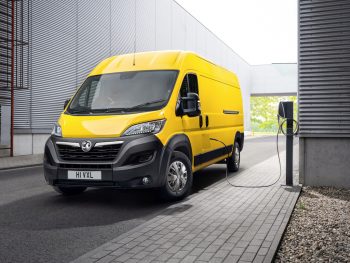A national ‘van plan’ for charging is essential to accelerate electric van uptake and deliver ambitious government targets.

The call comes from the Society of Motor Manufacturers and Traders (SMMT) as its new research shows 57% of van owners are anxious about going electric over fears they won’t be able to find a charging point when they need it.
While more than a third of all new van models are now available with a plug, only one in 20 buyers has switched to a battery-powered van so far in 2022. But persuading van drivers to make the switch will be essential for the UK to become net zero; there are currently more than four million vans on the road and they directly support around one in 10 workers. And vans are subject to the same 2035 end-of-sale date for non-zero emission vehicles as cars.
One in eight owners say they don’t plan to ever switch to an electric van, but the vast majority (88%) say they would go electric by 2035. While a fifth of these owners say they will defer the decision for three to seven years, many people (58%) inferred they might be convinced to buy an EV sooner if there was a greater number of public charging points. The availability of government incentives such as reduced tax or grants towards purchase would also steer 57% of respondents towards a zero-emission van.
The research has been published as the Commercial Vehicle Show opens today at the NEC in Birmingham, showcasing the latest electric vans as well as trucks – and the automotive sector is calling on all stakeholders to match its commitment to drive the electric transition.
It says we need a national ‘van plan’ to drive electric van uptake. A total 41% of respondents said they had nowhere to charge a vehicle at home or their depot, so both private and public charge point provision will be essential to drive the switch. But SMMT analysis shows the UK has just one public charge point available for every 32 plug-in vehicles on the road. And public charge points designed for cars will not always be suitable or in the right locations for vans, which also typically need a larger parking area.
This means that van charging provision must be factored into national infrastructure plans, according to the SMMT, with commensurate and binding targets for charge points for passenger cars and commercial vehicles to match the commitments of the automotive industry.
Mike Hawes, chief executive, said: “Britain’s businesses run on vans and if we’re to deliver the nation’s carbon emission cuts, we need them to move to electric. There’s an electric van to suit every business case, but we need a ‘van plan’ to ensure zero-emission driving works for the millions of people for whom their van is their livelihood and the millions more who rely on these workhorses for the delivery of their daily needs.
“The automotive industry is getting these new technology vehicles into the showrooms – we need government and other stakeholders to match our commitments to get them out on the road.”

